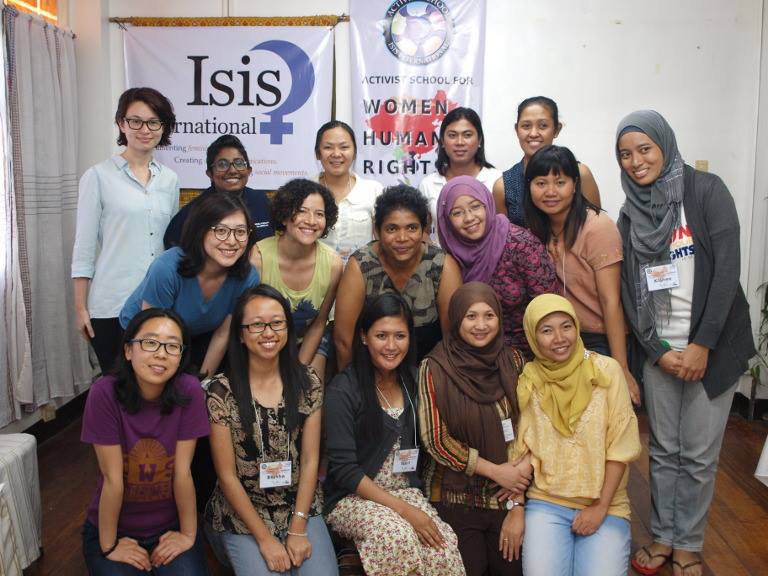 The Activist School for Women Human Rights Defenders took place from April 5-12, 2014. Fourteen activists from Cambodia, Malaysia, Indonesia, Philippines, Thailand, Hong Kong, China, East Timor and Colombia gathered at the Isis International Women's House in Quezon City, Philippines.
The Activist School for Women Human Rights Defenders took place from April 5-12, 2014. Fourteen activists from Cambodia, Malaysia, Indonesia, Philippines, Thailand, Hong Kong, China, East Timor and Colombia gathered at the Isis International Women's House in Quezon City, Philippines.
The theme for day 1 was 'Introducing Self-Reflexivity'. It began with participants sharing their expectations and objectives for the Activist School. These were presented as clouds above a tree filled with the apples, or contributions, each participant offered to the training.
The theme continued by exploring the need to sustain ourselves as activists from within. In the first module, participants were introduced to journaling as a tool for self-reflexivity. Developing these tools is a way of building the inner resourcefulness needed as activists and women human rights defenders.
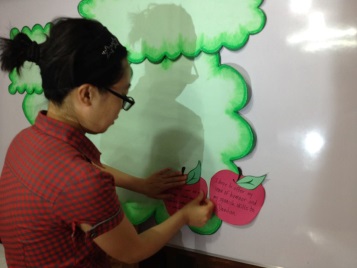 Da
Da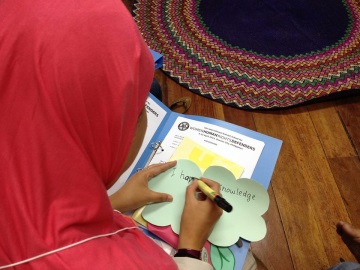 y 2 of the Activist School for Women Human Rights Defenders began with an opportunity for the participants to get to know one another and the work they do as activists in their own countries. Participants interviewed each other using open and clean questions.
y 2 of the Activist School for Women Human Rights Defenders began with an opportunity for the participants to get to know one another and the work they do as activists in their own countries. Participants interviewed each other using open and clean questions.
The day was focused on developing feminist frameworks of analysis. This included questioning our understanding of gender and sex, and interrogating expectations based on gender. This lead to challenging conversations about sexual orientation, gender identity and expression. The participants explored what changes in gender roles have occurred in recent times, and whether these have been positive, sufficient and widespread, and what factors have effected these changes.
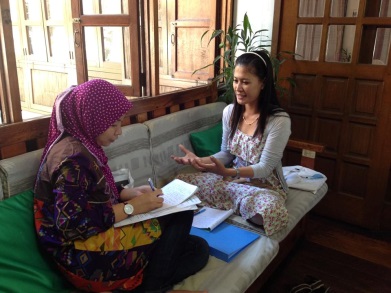 Peer groups were a daily feature of the Activist School for Women Human Rights Defenders from day 3. Participants met with others working in similar advocacy areas such as issues related to gender based violence, conflict and post conflict issues, and cultural and economic rights. The peer groups were a forum to deepen conversations from the previous day. On this morning, the peer groups developed their visions of positive gender roles that would enable people to contribute to their full potential.
Peer groups were a daily feature of the Activist School for Women Human Rights Defenders from day 3. Participants met with others working in similar advocacy areas such as issues related to gender based violence, conflict and post conflict issues, and cultural and economic rights. The peer groups were a forum to deepen conversations from the previous day. On this morning, the peer groups developed their visions of positive gender roles that would enable people to contribute to their full potential.
To bring about positive change activists and women human rights defenders challenge established ways of being and seeing the world. How do we break down dominant discourses to understand what is being said, who is being positioned and how, who the audience is and what the consequences are?
Day 4 of the Activist School for Women Human Rights Defenders was spent developing our sensitivity to language with discourse analysis and positioning theory. How can this help us in practice to frame and reframe our own advocacy campaigns to be more positive and effective? We looked at the case study of the Reproductive Health Bill in the Philippines, before analyzing and developing campaigns from our own contexts.
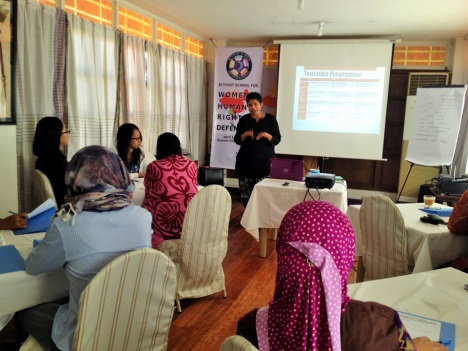 Day 5 of the Activist School for Women Human Rights Defenders began with each participant presenting their analysis of discourses and advocacy campaigns from their contexts using positioning theory.
Day 5 of the Activist School for Women Human Rights Defenders began with each participant presenting their analysis of discourses and advocacy campaigns from their contexts using positioning theory.
Based on the research Isis conducted on feminist critical collaborations, we looked at practical strategies to build alliances in non-unified global feminist movements. A common commitment to freedom for all who experience oppression can allow us to develop cross movement alliances. Participants identified alliances and strategies that could be used in the advocacy campaigns they had analysed.
The afternoon was spent examining how women human rights defenders might strengthen their advocacy by developing social media advocacy campaigns. Participants mapped their personal social media use and looked at how social media has been used for organising.
On day 6 of the Activist School for Women Human Rights Defenders we looked at the legal and political framework for WHRDs, their safety and security. We focused on understanding our rights and risks as women human rights defenders. To what extent should we assume risks as activists? How important is the well being of the human rights defender themselves?
Participants also looked at enhancing their protection and personal security. There was an interesting discussion about whether being women human rights defenders made them inherently vulnerable. They then assessed risk in their own contexts by evaluating threats and vulnerabilities against their capacities.
On the final day of the Activist School for Women Human Rights Defenders, the participants used Open Space Technology as a means of surfacing issues that they wanted to further discuss around the theme 'Moving forward with self|advocacy|movement'.
They brought their skills, knowledge and experiences as activists and women human rights defenders with what they had explored over the course of the Activist School.
And so the Activist School culminated with dynamic discussions developed and conducted by the participants themselves on issues including:
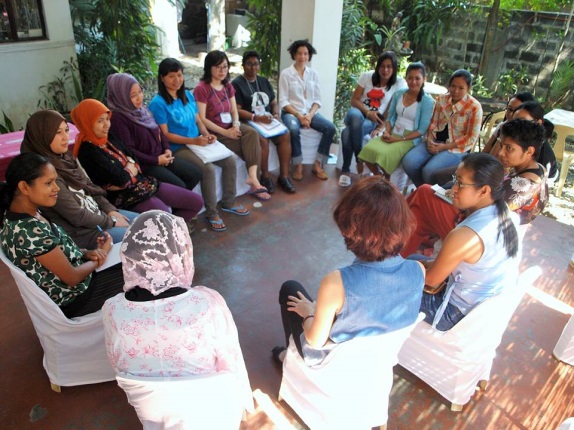
- the advocacy of sex workers rights in different contexts in Asia
- sexual orientation, gender identity and expression and LGBTI rights activism
- the language of rights and the language of development in the Asian context
- developing a movement of young women against sexual violence in the Asian context
- the most effective ways to encourage women to participate in the women's movement in the future
- how to build the trust within the alliance that we have built for stronger/effective advocacy.





 The
The 
 Isis Resource Center holds one of the largest feminist collections of materials in the Global South. With 40 years of publication experience, Isis holds a vast collection.
Isis Resource Center holds one of the largest feminist collections of materials in the Global South. With 40 years of publication experience, Isis holds a vast collection.